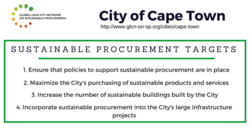5 September 2016
Sustainable procurement: helping the Paris Agreement fulfill its promise



Political representatives from the cities in the Global Lead City Network on Sustainable Procurement (GLCN on SP) gathered this Friday for the Network’s Mayoral Second Annual Summit in Seoul. Representatives used the occasion to present their key achievements on sustainable public procurement and to announce their targets as GLCN cities. Seoul Metropolitan Government, Chair of the GLCN on SP, chose to include the Second Summit as part of the Mayors Forum on Climate Change to show the importance of sustainable procurement to combat climate change and to showcase the activities of the Network participants in attendance – Seoul, Auckland, Budapest, Cape Town, Helsinki, Montréal, Quezon City, and Warsaw.
The purpose of the Mayors Forum on Climate Change was to outline how cities and local governments can support national and global efforts to raise the level of global ambition, to ensure a rapid entry into force of the Paris Agreement. In that sense, cities in the GLCN on SP are prepared to step up to the challenge of using procurement to address climate change and help ensure that the Paris Agreement lives up to its promise.
Seoul Metropolitan Government highlighted that in 2015, as a result of their mandatory requirement to purchase green products, procurement of sustainable products by the authority exceeded 50%. Len Brown, Mayor of Auckland, explained two major projects the city is involved in: a new metro rail which should help the city achieve 23% energy savings, and the replacement of 43,000 street lights with LED bulbs which will save NZ$36 million over 20 years.
Joy Belmonte, Deputy Mayor of the City of Quezon, detailed how the City’s Green Public Procurement Team, created in 2012, has been purchasing eco-labeled products and promoting the use of environmental friendly products. Johannes van der Merwe, Councillor of Cape Town Metropolitan Council, explained how the city has fully integrated energy efficiency requirements into IT procurement and used greener technologies for roads’ projects. The South African city now plans to finalize and adopt the Sustainable Procurement Action Plan as part of the City’s Green Economy Strategy and Action Plan.
Montréal, one of the latest cities to join the GLCN on SP, announced quantifiable targets for the electrification of the city fleet. Roger Lachance, Director of the Department of Environment of the City of Montréal, presented the plans: between this year and 2020 the City will convert 30% of the Société de transport de Montréal bus fleet to hybrid engines, and 230 municipal vehicles to 100% electric power in order to electrify and optimize the city’s transport system. Montréal will also increase the sustainability of its building stock in order to reach its target of reducing greenhouse gas emissions by 80% by 2050.
Perttu Pohjonen, Special Envoy for the Deputy Mayor of Helsinki, explained how the city’s environmental network for procurement has reinforced the cooperation and information exchange needed for Helsinki to reach its 100% SPP target by 2020. Peter Szegvari , Senior Advisor to the Lord Mayor of the Capital City of Budapest, introduced some of the SPP initiatives underway in the capital of Hungary. These include the inauguration of a public bicycle-sharing system to reduce GHG emissions and the use of green criteria in the procurement process for the lighting of the Liberty Bridge, which resulted in the purchase of more than 500 LED light bulbs.
Marta Kęsik, Inspector of the Department of Strategy and Development of the City of Warsaw, announced plans to invest in the city’s public transportation and district heating. By 2020, the capital of Poland aims to bring 130 electric buses into operation and connect 229 social buildings to district heating. Improved energy efficiency in buildings is another key target, with guidelines for the proposed criteria to improve energy efficiency in buildings currently being developed.
Background information
The Global Lead City Network on Sustainable Procurement is a group of 14 cities committed to drive a transition to sustainable consumption and production by implementing sustainable and innovation procurement. Seoul (Republic of Korea) – Chair of the Network –, Auckland (New Zealand), Budapest (Hungary), Buenos Aires (Argentina), Cape Town (South Africa), Denver (United States), Ghent (Belgium), Helsinki (Finland), Montréal (Canada), Oslo (Norway), Rotterdam (The Netherlands), Tshwane (South Africa), Quezon City (Philippines) and Warsaw (Poland), as part of the GLCN on SP, are taking an exemplary role globally by purchasing sustainably and setting ambitious targets.
Building on its 20 years of experience on sustainable procurement, ICLEI acts as co-ordinator of the Global Lead City Network on Sustainable Procurement. Korea Environmental Industry and Technology Institute (KEITI) has welcomed the initiative.


